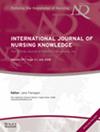Clinical validation of the ineffective social support network nursing diagnosis in violence-victimized women
Abstract
Purpose
To verify clinical validity evidence for the ineffective social support network nursing diagnosis.
Method
A quantitative, descriptive, cross-sectional study was performed with 98 violence-victimized women treated in two reference centers for violence in the city of Recife, Pernambuco, Brazil. The women were interviewed from August 2021 to June 2022.
Findings
The clinical indicators that best predicted the nursing diagnosis were as follows: Frustration with unmet support expectations, negative social interaction, perceived neglect of support demands, feeling of abandonment, low reciprocity, and encouragement of negative behaviors. Etiological factors that showed greater association were excessive demand for support, limited social network, social isolation, the fragility of institutional service networked organizations, and inadequate appreciation of available social support.
Conclusions
The clinical validity evidence for the ineffective social support network nursing diagnosis has been verified. Thus, the validated clinical indicators and etiological factors can accurately diagnose and predict the emergence of this phenomenon in violence-victimized women.
Implications for nursing practice
The results contribute to advancing scientific knowledge in nursing teaching, research, and practice and support the nursing process in violence-victimized women.

 求助内容:
求助内容: 应助结果提醒方式:
应助结果提醒方式:


